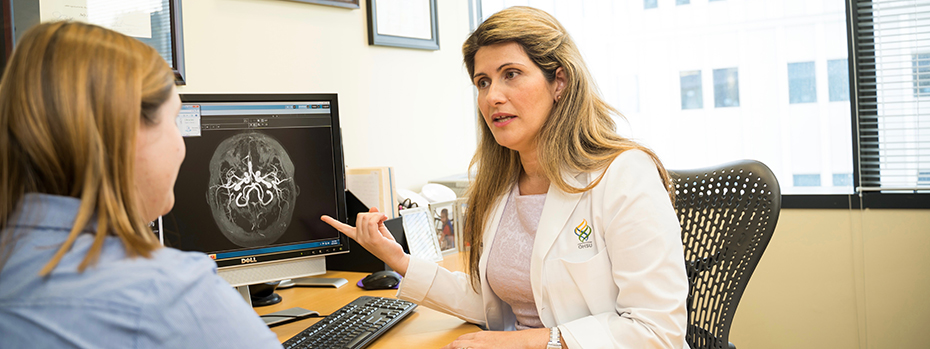Headache FAQ and Resources

We’ve gathered information to help you:
- Find answers to frequently asked questions.
- Track your headaches in a headache diary.
- Learn more about headaches.
- Find relaxation and mindfulness resources.
- Connect with headache and migraine organizations.
Headache and migraine FAQ
Migraines are a common neurologic disorder. (Neurologic disorders are those of the brain, spinal cord and nerves.) Migraines result from abnormal cell activity deep in the brain stem. Symptoms vary widely from patient to patient. Some have no headache, and others have a moderate to severe headache. Migraine attacks can also come with:
- Numbness
- Tingling
- Dizziness
- Speech difficulty
- Vision distortion
Answering yes to one or more of these questions may indicate that you have migraines:
- Do relatives have migraines? Migraines commonly run in families.
- Do I have nausea or vomiting with my headaches?
- Do I want to lie still and in the dark to feel better?
- Are headaches interfering with my job and/or family life?
- Am I sensitive to bright light, sound, smell or touch during my headaches?
Yes, several types of medication can worsen migraines:
- Antidepressants: Common SSRIs (selective serotonin reuptake inhibitors) such as Zoloft, Paxil and Prozac are among antidepressants that can worsen migraines.
- Pain relievers: If taken too often, medications including the following can worsen a migraine instead of help:
- Advil (ibuprofen)
- Tylenol (acetaminophen)
- Excedrin (formulas vary, but Excedrin Migraine contains acetaminophen, aspirin and caffeine)
- Imitrex (a prescription medication that contains sumatriptan)
Lifestyle changes can help:
- At least three times a week, get some cardiovascular exercise for 40 minutes.
- Go to bed and get up at the same time each day.
- Sleep six to eight hours a night, but not more than eight.
- Try taking melatonin at night instead of pain medication or sleeping pills.
- Eat regular meals and snacks. Don’t skip meals.
- Drink at least 1.5 liters (50 ounces) of water a day. This is just over six 8-ounce glasses.
- Limit medication use.
- Limit your caffeine intake to 200 mg a day, roughly the amount in a 12-ounce cup of coffee.
- If you wear glasses, try adding a light-diffusing tint to your lenses.
- Try meditation or mindfulness exercises to lower stress. Many apps can guide you.
Yes, taking some vitamins and supplements can help prevent migraines:
- Vitamin B2 and Coenzyme Q10 can boost stores of energy, which can be low in migraine patients.
- Melatonin, a sleep aid, can ward off sleep disturbances and help prevent migraines.
- Low magnesium levels have been shown in the brains of migraine patients. Boosting it could avoid migraine attacks.
OHSU’s Dr. Juliette Preston recommends this combination:
- Vitamin B2 (riboflavin), 400 mg a day
- Coenzyme Q10, 300 mg a day
- Magnesium citrate, 400 mg a day
- Melatonin, 3 to 6 mg at bedtime
- My headaches interfere with my job, family or school.
- My headaches no longer respond to over-the-counter medications.
- I worry that I am taking too much over-the-counter medication (more than 10 to 15 tablets a month).
- My headaches have changed. They are becoming more severe or more frequent, or they come with weakness, numbness or trouble seeing.
- I had to go to an emergency room for a headache.
- I have new headaches, and I am older than 40.
An MRI (magnetic resonance imaging) uses powerful magnets and radio waves to create detailed images of organs and tissue inside your body. You should have one for headaches if:
- You are having headaches for the first time and are older than 50.
- Your headaches are triggered by vigorous exercise or sexual activity.
- You are having the worst headache of your life.
- You are having:
- Confusion
- Weakness
- Numbness
- Difficulty speaking
- Double vision
- Distorted vision
- Trouble walking
Make sure to drink enough water. Use of birth control pills combined with becoming dehydrated can cause a blood clot in your brain, possibly leading to a severe headache and stroke.
At the same time, taking birth control pills continuously (skipping the placebo week) can lower how often you have migraines.
Headache diaries
Headache and migraine information
- Headache Information Page, National Institute of Neurological Disorders and Stroke
- Headaches, National Center for Complementary and Integrative Health
- Headaches: In Depth, National Center for Complementary and Integrative Health
- Migraine Information Page, National Institute of Neurological Disorders and Stroke
- Migraine, Office on Women’s Health, U.S. Department of Health & Human Services
Mindfulness and meditation
Websites:
For patients
- Referral: To become a patient, please ask your doctor for a referral.
- Questions: For questions or follow-up appointments, call 503-494-7772 .
- Virtual visits: Online follow-up appointments are available through MyChart.
Location
Parking is free for patients and their visitors.
OHSU Headache Center
Center for Health & Healing Building 1, eighth floor
3303 S. Bond Ave.
Portland, OR 97239
Map and directions
Refer a patient
- Refer your patient to OHSU.
- Call 503-494-4567 to seek provider-to-provider advice.
- See our headache information for providers.